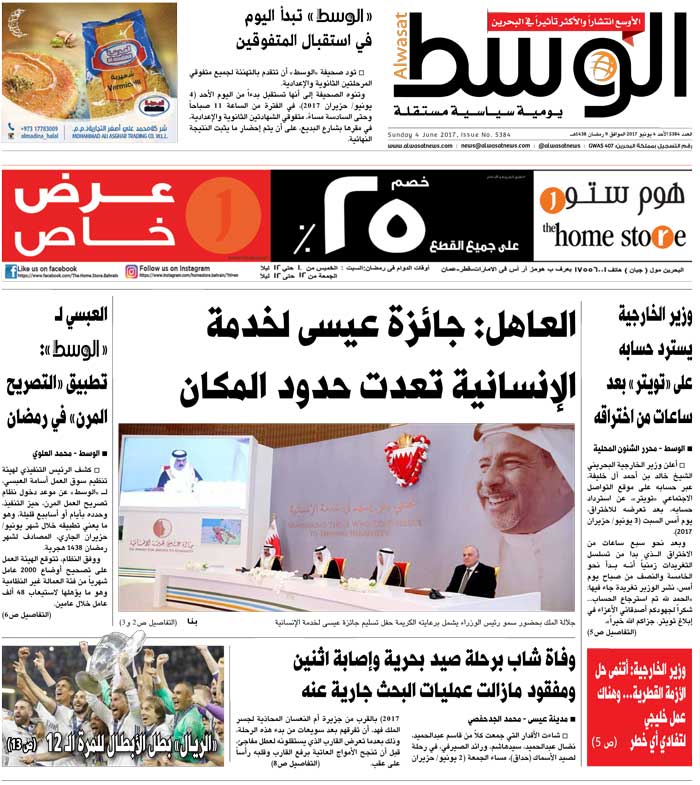[vc_row][vc_column][vc_column_text]International press freedom organisations and local Bahraini groups are among fifteen campaigners who today raised alarm over the suspension of Bahrain‘s only independent newspaper, Al Wasat, which has been barred from publishing for four days now. The rights groups which today wrote letters addressed to ten countries including the UK, state Bahrain is “effectively silencing the media in Bahrain and violating the right to freedom of expression.”
The letters, signed by Index on Censorship, Reporters Without Borders, Committee to Protect Journalists, Article 19, Bahrain Institute for Rights and Democracy and ten others wrote to states urging them to “publicly call on the Government of Bahrain to allow Al Wasat to resume publication immediately.”
The letter is addressed to the United Kingdom, United States, Germany, Italy and France – who all have embassies in Bahrain – as well as Ireland, Norway, Denmark, Sweden, Finland and the European Union.
The Ministry of Information Affairs suspended Al Wasat, the only independent newspaper in Bahrain, on 4 June 2017, effectively silencing the media in Bahrain and violating the right to freedom of expression. Al Wasat’s suspension is the latest in a recent spate of reprisals against independent media and civil society actors, including journalists, writers, and human rights defenders. The state-run Bahrain News Agency claims that the paper is “spreading what would stir divisions within the community and undermine the Kingdom of Bahrain’s relations with other countries.” Al Wasat was suspended due to the publication of an opinion article regarding widespread protests in Morocco, a source in the newspaper told BIRD.
Politics in the region has developed quickly since the suspension of the newspaper. On Monday, Bahrain, Saudi Arabia and the United Arab Emirates closed diplomatic relations with neighbour Qatar and barred all air, sea and land travel. Yesterday, two Bahrainis were sentenced to death, bring the total up to 15 on death row.
Prior to the suspension of Al Wasat, Bahrain was already counted among the 20 most restrictive countries for press globally, with Reporters Without Borders ranking Bahrain as 164 out of 180 countries in its World Press Freedom Index.
This is the latest in an escalated crackdown on independent civil society. On 23 May, Bahraini security forces raided the village of Duraz, killing five protesters and arrested 286. It is the deadliest incident since protests began in 2011. On 31 May, the last major opposition society, Wa’ad, was dissolved and their assets confiscated. Wa’ad is appealing the decision. The letter continues, “In this context, journalists in Bahrain have expressed to NGOs serious concerns that the newspaper will not be allowed to resume publication.”
Al Wasat, established 2002, is the only independent newspaper in Bahrain. Its editor Mansoor Al-Jamri is winner of the CPJ International Press Freedom Award in 2011 and winner of the Peace Through Media Award 2012. It has been suspended in previous years, in April 2011 and August 2015. In January 2017, the newspaper’s website and social media were suspended for two days. it In 2011, Abdulkarim Al-Fakhrawi, one of the paper’s founders, was tortured to death in police custody.
Comments
Melody Patry, Head of Advocacy, Index on Censorship: “The silencing of Al Wasat – the only independent voice in Bahrain’s media – underscores the dismal state of human rights in the country. The Bahraini government must allow free and unfettered access to information.”
Cat Lucas, Writers at Risk Programme Manager, English PEN: “By silencing the only independent newspaper in the country, the Bahraini authorities are sending a clear message that dissenting voices will not be tolerated. Our governments must send an equally clear message that the suspension of Al Wasat is unacceptable and that a plurality of voices in the media is an essential part of any democracy.”
“Bahrain is experiencing a severe crackdown on freedom of expression. Now is the time for the international community to speak up to defend fundamental human rights, in particular, the right to freedom of expression, which is crucial for promoting stable, pluralistic democratic societies,” said Saloua Ghazouni, Director of ARTICLE 19’s Middle East and North Africa regional office.[/vc_column_text][/vc_column][/vc_row][vc_row][vc_column][vc_basic_grid post_type=”post” max_items=”12″ style=”load-more” items_per_page=”4″ element_width=”6″ grid_id=”vc_gid:1496907779680-4f997749-0326-5″ taxonomies=”716″][/vc_column][/vc_row]






